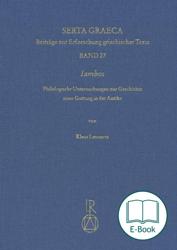Here, Klaus Lennartz presents for the first time his overall view of the antique genre of the Iambos: examining the “Truth effect” of the Solonic Iambic tradition and the integration of the Iambic “Classics” into the forms of discourse of the fifth century, together with the “Archilochus” and “Hipponax” questions, the Iambos Renaissance by Kallimachos and the Hellenists, the transformation of the Iambos into the Epigrammatic approach of Catullus and “client-orientation” of Horace as the Roman Archilochus. “Iambos. Philological investigations on the history of a genre in Antiquity” has been designed as a “molecular” reference work, while remaining a case study on the proliferation of a genre, that nevertheless exerts an influence beyond the boundaries of specialism.
Until recent times, the “Iambos” has been amongst the most hotly disputed research topics in Greek verse poetry: Since the middle of the seventh century before Christ, strongly delineated performers of particular verse genres (Trimeter, Tetrameter, and to some extent also of “half melic” short strophes, known as “Epodes”) make their appearance, represented above all by Archilochus of Paros (around 650), Semonides of Amorgos (a younger contemporary, whose best-known work is the so-called “Mirror of Women”) and Hipponax of Ephesus (around 500: the “Inventor” of the meter known as the “limping Iambic”!). In these works, topics come to the fore, which seemed (not solely) to the modern observer to be unremittingly “personal”, and which were so explicit as to become “Confessional poetry” bordering on pamphleteering and pornography. In 1974 Martin Litchfield West instigated a “Copernican Revolution” in the perception of this genre by interpreting the presumed personal statements by Archilochus as ritualised expression required by the role he adopted. This “stock-character thesis” was opposed particularly in Germany and Italy: Wolfgang Rösler postulated a group context connected with the “symposion”, which implied that the Iambists were poets of an “inner circle”, whilst for Enzo Degani, Hipponax, the ionic “mendicant poet”, the “Villon of antiquity”, emerged anew as a pre-Alexandrine poeta doctus, who pursued his game of literary deceit through ironically-revealing self representation. Against the background of these highly topical research debates, the Hamburg classical philologist Klaus Lennartz undertakes for the first time to paint the global picture of the Iambos, and interprets the dynamics of this literary form as “selections of possible states” which establish the genre, and as receptional dis-automation and petrifaction. In this way, the “Truth effect” of the Solonic Iambic tradition (around 600) and the integration of the Iambic “Classics” into the forms of discourse of the fifth century are examined, together with the “Archilochus” and “Hipponax” questions, while the author comments on the Iambos Renaissance by the avant-garde “Literary Archaeologist” Callimachus (with the production an overall philological appreciation and a new assessment of the Hellenistic Iambos). Leaving the Greek language area, the transformation of the Iambos into the Epigrammatic approach of Catullus and “client-orientation” of Horace as the Roman Archilochus are considered: here, Lennartz questions the inter-textual strategies of these pieces, which are often assumed to be self evident, by rigorously measuring them against the actual testimonies, and thus arrives at an understanding of the genre as it applies to one of Europe’s most significant poets. “Iambos. Philological investigations on the history of a genre in Antiquity” has been designed as a “molecular” reference work, while remaining a case study on the proliferation of a genre, that nevertheless exerts an influence beyond the boundaries of specialism.
Klaus Lennartz studied Greek, Latin and Mediaeval Latin Philology at the Institute for Antiquity at the University of Cologne, where he passed his MA degree in 1990. From 1991 to 1993 he worked as a specialist researcher at the Institute for Greek and Latin Philology at the Free University of Berlin, obtaining his PhD in 1993 in Cologne with his Doctoral Thesis“Non verba sed vim. Critical and exegetic investigations regarding the fragments of archaic Roman tragedies”, which was published one year later (appeared in 1994 as BzA 54). From 1994 to 2000 he was a Research Assistant at the Institute for Greek and Latin Philology in the University of Hamburg, and since the year 2000 he has been teaching there as a lecturer. He completed his habilitation in 2007 with original research, a history of the genre of the Iambos (“Iambos. Philological investigations on the history of a genre in Antiquity”), and he was awarded the title of “Professor” in 2009. Lennartz teaches Greek, Latin and Mediaeval Latin Philology, and has produced numerous philological essays, short articles, encyclopaedia articles and reviews in all three fields (e.g. on Plato, Menander, Kallimachos, Ennius, Catullus, Matthew of Vendôme and John of Salisbury). Apart from academic teaching, his main interests at the present time are two extensive studies concerning the dramaturgy of Plato’s Dialogues, and Theodulus’ Ecloga, whilst he is also working on an updated, commented edition of Lindsay’s Nonius Lists.
“Toutefois, cet ouvrage est précieux et original pour la tradition indirecte qu’il mobilise et pour l’état exhaustif qu’il donne de la discussion contemporaine. (...) Les index sont utiles pour se repérer dans de volume, qui est une somme documentaire sur le sujet et par là-même und référence incontournable pour qui veut se spécialiser dans la poésie iambique.”
Fabienne Blaise
In: L’antiquité classique. 81 (2012). S. 184-187.


 Table of Contents
Table of Contents